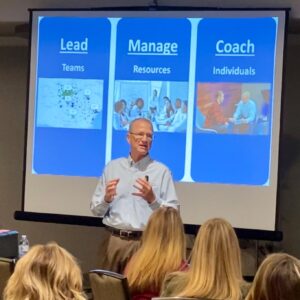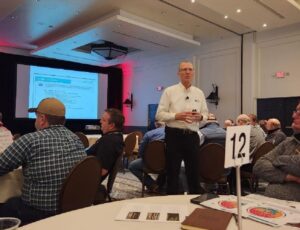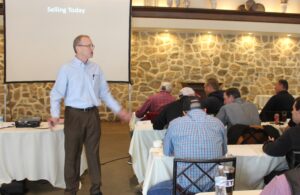Our journey to eliminate the gap between what we know we should do and actually doing it continues.
Part 1: Knowing how to sell is not enough
Part 2: Talking too much.
Part 3: Routine versus a Rut.
Today, we dig into cause #3: Fear
Fear is often described as false evidence appearing real. I’d like to debunk that myth. If you’ve been at your job for any length of time, you know fears are real and not just in your mind. They are there for a reason.
- Get too pushy and your prospect will avoid you.
- You can lose your big account.
- You can fall off the sales leaderboard.
- You can become outdated on the technical side of your business.
In a long sales career, I’ve seen peers and myself be part of these fears becoming a reality. Ignoring them is a great way for them to come true. So, be careful of those motivational messages that tell you to ignore those fears. The real messages to listen to are how to manage and work through those fears.
Today, I’d like to deal with two specific fears. They prevent us from doing what we know we should do. The first fear is more of a paralyzing fear and that is the fear of change.
Fear #1: Doing something new, untested or against conventional wisdom.
Trust me when I tell you the greatest accomplishments in your career will come from thinking different than the crowd and going in a new direction. Tried and true will get tried and true results. Nothing wrong with that. But if you are trying to differentiate, then by the very nature of the word, you need to try different methods. Ask yourself, what do every one of your peers and competing salespeople know or do? What are the conventional wisdoms that drive your actions?
- Conventional Wisdom: “Don’t call on producers during harvest” Result: we spend weeks and months waiting around for harvest, planting and the holidays to end so we can go back out and call on prospects. We fear looking pushy, salesy or not understanding the producer’s business if we go out during their busy time. Solution: Find other ways to stay in touch: email, text, social media, networking meetings. Find out when each specific producer will be done with harvest. Total harvest can last several months depending on the weather. However, each producer is different and you can catch them when they are done, not the entire industry.
- Conventional Wisdom: “Big volumes and big money are in the lactation ration” Result: we don’t ask about calf feed or preservative sales. These are typically higher margin and not as competitive as is the lactation diet. Solution: While the whole sales world is chasing the big volume products, look for alternative ways you can help your customer. Even better, look for entire market segments that are getting little attention or that you can become an expert in. Examples are the premium pet food market in the 1980’s and the retail feed business in the 1990’s. Initially, small niche markets that became significant. But someone had to take the risk of breaking from conventional wisdom and focusing on these new markets.
- Conventional Wisdom: “In a tough economy, nobody is buying new equipment” Result: We make fewer farm calls, offer fewer equipment demos, cut back marketing efforts and become complacent. You end up proving what every storyline says in the agribusiness news – producers are buying less equipment – so why try. Solution: First, quit using national headlines to drive your individual sales efforts. They are made to get clicks and are often repeated from one source. Certainly, stay up on trends, but understand each customer has their own story and financial situation, which may be contrary to the headlines. Secondly, when times are tough, customers need you more than ever. They are still farming, which means they are still using equipment. If it’s not new, then it’s used and needs more parts and service. Get creative on how you can call on customers with new ways to engage them with your store.
What are the conventional wisdoms in your industry? Challenge them!
Fear #2: Rejection or getting a “no” and then having nowhere to go.
As I mentioned in part one of this blog series, I don’t think we are actually afraid of the rejection or the “no”. We really are afraid that we will have nowhere to go with this prospect once we get rejected.
In our minds, we see ourselves as a good salesperson that connects well with our customers. We start sales calls with a little small talk to warm them up and then tell them all about how good our products are – pretty standard stuff! We think, “I’m going to keep presenting features and benefits until the light goes on in this customer’s mind. Then they will just jump up and ask to buy.”
When this doesn’t happen, we think, “It’s not me. They just don’t see the benefit of my products. I’ll keep selling until they do.” And then you run out of time on the sales call. The customer shuts you down with, “I gotta go. I’ll look at it. Let me talk with my spouse….”
The solution is easy to understand but hard for many salespeople to execute. Quit presenting and learn how to uncover value with your customer. The #1 way to do this is by asking better questions than you are right now. I know it’s tempting to squeeze in as much of your technical data as possible in those 30 minutes the customer gave you, but fight the urge. I know your customer is expecting you to present your products, but fight the urge to show up and data-dump all over the place. Stop presenting- Start asking- Get better at listening. After all, whose words are more important to the customer, yours or his?
As salespeople, these two fears have a way of working themselves into our minds and daily lives. At times, they prevent us from hurting ourselves, but mostly, they keep us from taking a chance and Doing what we know we should. If it’s any consolation, every salesperson is dealing with these two fears at some level. It’s tempting to think we are the only ones that have the level of fear that we have. Your journey to becoming a better salesperson is not dependent on whether or not you have these fears, but rather on how you handle these fears.
Please join me next time as we discuss Cause #4 & 5. We’ll dig deeper into each area and give a fresh look at an age-old problem of knowing but not doing!
Cause #4: Ineffective Measuring.
Cause #5: Misplaced competition.
If you found this to be helpful, forward on to someone you know who might also appreciate it.



